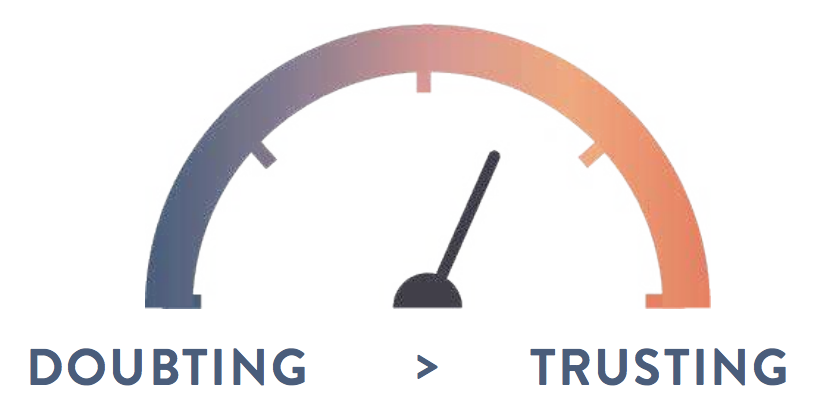
In brief
In “The moment we noticed” we reported on a society wide shift from Doubting to Trusting. Here, David considers the implications, and the potential, for transforming the approach to social care.
Last week we learnt that the PM had appointed a high level adviser to work on shifting responsibility for social care out of the local authorities where it has resided for decades, and into the NHS. Separately, apparently, ministers are planning to take direct control of the NHS away from the arm’s length, NHS England and back into Whitehall Central.
No doubt, social care is battered and broken but swallowing the system, a care system dependent on personal relationships and human insight, into the NHS, a soon to be further centralized behemoth that already employs 10 times as many people as the army, is a desperate lunge in the wrong direction. Suppose government started instead at the other end of the telescope. 10m people have been caring for one another for at least 3 hours a week over the last 4 months.So, the good citizens of No 10 will now run social care. Really?
78% have said they want to carry on doing something similar. The lockdown was a unique experience for everyone. As more familiar routines kick back in, it is likely that the 78% number will go down. Perhaps it will turn out to be 50%. Maybe even 20%. That’s still 2m people willing to play a part in caring for neighbours. Whats App and other simple technologies were harnessed to organise and collaborate, street by street. As we reported in The Moment We Noticed, many of the best local authorities have been collaborating very effectively with these community support networks over recent months. Collaborating and learning. A similarly simple, digital platform could be used to organise volunteers and statutory services around those who need support beyond the lockdown. Volunteers in the “huddle” could be responsible for daily checks, practical needs like shopping, accompanying on visits to the doctor etc and be first responders in an emergency.Checking on the neighbours and doing a bit of shopping isn’t social care but it’s a start
They would provide specialist services, support and oversight. Huddles might also meet other needs. Families in need of extra assistance for instance, even short term respite support.Social service professionals would be organised on a similar neighbourhood scale, small teams locally rooted, a little bit like the successful Buurtzorg model in the Netherlands.
Again, the experience of the lockdown is encouraging if not directly transferable: Simple, practical tasks or transactions were seen to develop into multi faceted and sometime reciprocal relationships.It is a model that would depend on good training and support and then trust and empathy much more than standardisation and compliance.
Whilst it might be difficult for me alone to rely on a stranger without the comfort of bureaucratic protocols, I am adequately reassured by the confidence of my neighbours. In other fields, micro credit for instance, we have seen how trust breeds trust and when we trust, we’re more likely to comply. This is the TripAdvisor or Airbnb sensibility reshaping community care. Of course this isn’t an alternative to a care home – full time residential support for those that need it most – but these ideas begin a completely new conversation about social care.Community has become a resource, rather than something that needs to be fixed, and trust in others the new currency of compliance.
Well designed and co-produced micro care would improve lives. I have a hunch that ultimately it would also save money.Instead of asking how do we manage, finance and regulate a warehousing system for nameless numbers who can no longer cope alone, it starts with a different question: How can we better care for one another, for friends and neighbours, by building better relationships?
Are there clues in the pandemic experience for the development of more community based, relationship centred social care? What would need to change and what support would it require? We would love to hear from you.
